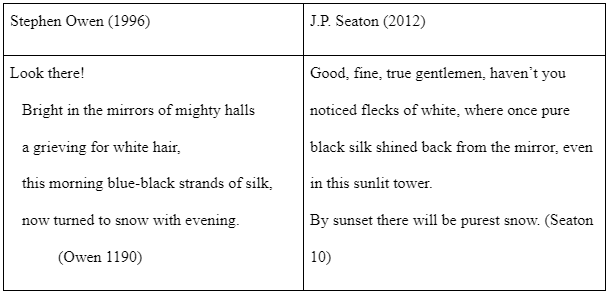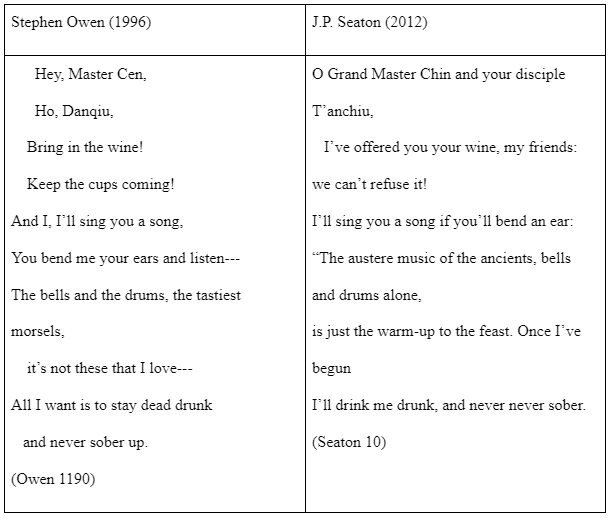
Li Bai – The Master In Chinese Poetry
Born in 701, Li Bai (pronounced ‘Li Bo’ in Mandarin), had been inflicted with countless predicaments and crucibles. Yet, at the same time, he kept writing poems reflecting his emotional, inward mind and had earned the title of “the most romantic figure in Chinese literature.” As one of the most renowned and unsurpassed poets in Chinese history, Li Bai left the world with many profound and phenomenal masterpieces worth exploring.
In this article, I will be comparing two English translations of the masterwork written by Li Bai in 736, ‘Bring in the Wine.‘ Li Bai was banished by the emperor of the Tang dynasty when he felt the urge to write this poem. I’ve chosen the translations of Stephen Owen (1996) and J.P. Seaton (2012) to review. After reviewing the two translations, I will argue that the version by Stephen Owen is superior to the interpretation by J.P. Seaton because of the accuracy of translated words, the depiction of the scenario, and the sensible organization.
The Accuracy
First, let’s look at the accuracy of translated words by each translator:

The stanza I quoted above is the preamble of the poem. When writing this poem, Li Bai is standing at the top of a mountain and looking down a river, making him realize how time flies so fast and life is so short that we should make the best use of our lives. In Owen’s translations, he uses “Look there!” to start the stanza, which draws readers’ attention to the moral that the poet wants to articulate.

In the original work by Li Bai, he also uses words that draw readers’ attention at the beginning of this stanza. What Li Bai means “there” is that he wants his fellows to look at the river right below them so that they realize that life goes on without turning back like the water flowing down the river. Owen has grasped the original work’s meaning and translated with similar words that don’t alter Li Bo’s message in the poem.
However, in Seaton’s translation, he uses “Good, fine, true gentlemen” to unveil the poem. This interpretation does not align with Li Bai’s intention to grab the readers’ attention at the beginning of the stanza. Li Bai does not refer to any specific person when he writes the poem in the original work.
Instead of pointing out that the target audience is a group of “Good, fine, true gentlemen,” Li Bai aims to use the poem to alert all his friends to treasure the opportunities and time that they have got. Therefore, Seaton’s translation does not match with the intention of the poet and doesn’t provide a relatively accurate translated piece that enables non-Chinese speakers to understand the message left by Li Bai.
The Depiction Of The Scenario
Second, let’s look at how each translator depicts the scenario that Li Bai is drinking wine with his friends:

In Owen’s translation, he depicts the scene where Li Bai is drinking wine happily with his friends with details. He simplifies the original work by using words in brevity to describe the whole scenario and the actions of Li Bai. For example, in Owen’s translation, he uses “Bring in the Wine!” to conclude the excitement and impulse that Li Bai engendered in the poem.

However, in Seaton’s translation, he writes, “I’ve offered you your wine, my friends: we can’t refuse it!” to describe Li Bai inviting his friends to drink with him. We can see that Seaton’s translation is wordy compared with the work of Owen. The two translations mention the same scenario in which Li Bai invites his friends to enjoy a nice bottle of wine together, but Owen’s translation is less redundant.
Also, when we look at the end of the stanza, Owen concludes the feelings of Li Bai are that “All I want is to stay dead drunk and never sober up.” In contrast, Seaton writes, “I’ll drink me drunk, and never never sober.” Seaton made a grammatical mistake here that he should write as “never ever” instead of “never never.”
Grammatical errors make it confusing for readers and difficult to indulge in the scenario depicted in the poem fully. Therefore, in terms of the depiction of the scenario, Owen’s translation is superior to Seaton’s translation.
(Article continues below ad)
Sponsored Ad
The Organizaiton
Finally, let’s examine how each translator organizes the poem:

In Owen’s translation, every punctuation is placed accurately according to the meaning and the structure of the sentences. For example, Owen writes, “Then take my dappled horse, Take my furs worth a fortune, Just call the boy to get them, and trade them for lovely wine.” From this interpretation, we know that Li Bai orders a boy to get his horse and fur so that he can trade them for some good wine. Owen organizes the order of Li Bai with sequence and sensible punctuation so that readers can easily follow the thread of the poem.
In Seaton’s translation, he only translates the poem’s meaning but neglects the organization. For example, Seaton writes, “I have a five-flower horse, and a cloak worth a good thousand gold! Call the boy and send him out for more good wine!.” In this interpretation, Seaton does not include the objects in the second sentence. Readers may be confused about why Li Bai has to call the boy and how the boy can buy some good wine without having any fortune.
Also, in Seaton’s translation, he writes, “There’s always more where that came from…..”
Here, he uses “….” to end a sentence, which is inappropriate as he can further extend the original work’s meaning. Using “….” makes the translation lack coherence as the two sentences aren’t connected by meaningful words. Instead, they connect through meaningless punctuation.
‘Bring In The Wine’ by Li Bai- A Difficult Yet Amazing Piece To Study

In conclusion, I found Owen’s version superior to Seaton’s for the accuracy of translated words, the detailed depiction of the scenario, and the sensible organization. Owen’s translation aligns with the meaning of the original work. It serves as a preliminary platform for readers to get into the world of Chinese literature. Owen has grasped Li Bai’s core message in the poem: to alert people that life is short, and we should live in the moment.
On the other hand, Seaton does not present the core message of the poem in front of the readers well. He neglects some of the details in the poem, especially the hyper aura when Li Bai is drinking wine with his friends. The grammatical mistakes and poor organization constructed in Seaton’s translation also block readers from deriving the poem’s message.
Comparing the two translations, I conclude that Seaton’s version is relatively crude while Owen’s version is brief and precise.



